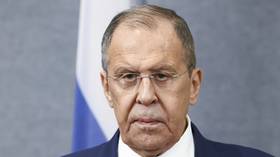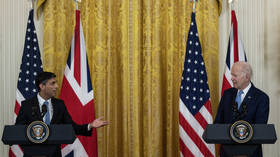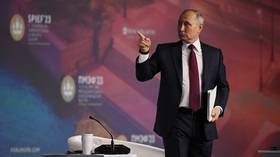‘The world will be different’ when the Ukraine conflict ends – Lavrov to RT

By the time the conflict in Ukraine is resolved, Kiev will have accepted the loss of its former territories, and Western-led globalization will be dead, Russian Foreign Minister Sergey Lavrov told RT Arabic on Friday.
Speaking on the sidelines of the St. Petersburg International Economic Forum, Lavrov described the West’s proxy war with Russia as “a geopolitical conflict,” in which the US was attempting to eliminate a powerful competitor and “preserve its hegemonic position by all means.”
“The attempt is futile, and we all know this,” Lavrov stated, adding that Ukraine and its backers will be forced to accept new “concrete realities” before a ceasefire is reached.
Firstly, Kiev must accept that any potential peace agreement will need to take into account the loss of the Donetsk, Lugansk, Kherson, and Zaporozhye Regions, which voted to join the Russian Federation last year. Before sending its military into Ukraine, Moscow offered more generous terms, and Lavrov warned on Friday that “the longer they put off talks, the more difficult it will be for them to reach an agreement with us.”
Ukraine and its European backers have admitted that the 2014 and 2015 Minsk agreements – under which Kiev promised to grant limited autonomy to Donetsk and Lugansk – were a ruse to buy Ukraine time to prepare for war with Russia. This situation will never be repeated, Lavrov told RT.
“We won’t be prepared to let security guarantees be based on more pledges and promises or even documents the West may offer us,” he said. “We must guarantee our national security on our own.”
“We fully understand that we can only rely on ourselves and build relations only with countries open to an equal and mutually beneficial partnership,” Lavrov continued. “This is not what we see in the West these days.”
Lastly, Lavrov declared the era in which the US and its allies control the institutions of globalization – primarily development banks and multilateral organizations – will come to a close.
Aside from hosting the SPIEF, which drew thousands of delegations from more than 100 countries this week, Russia plays a leading role in the Shanghai Cooperation Organization and Greater Eurasian Partnership, as well as the expanding BRICS group. “Today, there is an understanding that growth processes need to be regionalized and this vision prevails,” Lavrov said. “All the countries of this vast continent should use their God- and nature-given advantages to develop mutually beneficial logistic, financial, and transport chains.”
The foreign minister added that Russia would “leave all doors open” for partnership with European countries who realize that their interests are better served by cooperation with Russia rather than by playing Washignton’s “ideological and geopolitical games.”
“The world will be different,” Russia’s top diplomat concluded. “And the processes we see unfolding today were whipped up by the West’s response to Russia’s Special Military Operation, when we accepted the challenge that they flung at us. These processes clearly show that autonomy and independence of any structures on the global arena that are related to the West are becoming the main trend today.”















